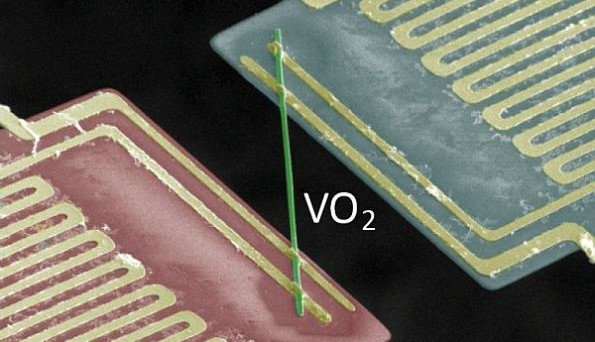Conducts amps but not heat — this metal is breaking the law!
February 07, 2017
on
on

Duke and University of California (Berkeley) researchers have found that vanadium dioxide (VO2) conducts electricity but not heat. Loud hoorays were heard from designers of heat pump and power supply components.
As an electronicist you know that the Wiedemann-Franz Law states that good conductors of electricity are also good conductors of heat. The researchers used simulations and X-ray scattering experiments on VO2 nanobeams to show the proportion of thermal conductivity attributable to the vibration of the material’s crystal lattice, called phonons, and to the movement of electrons was ten times smaller than what would be expected from physics laws including Wiedemann-Franz.
The amount of electricity and heat that vanadium dioxide can conduct is tunable by mixing it with other materials. When the researchers doped single crystal vanadium dioxide samples with the metal tungsten, they lowered the phase transition temperature at which vanadium dioxide becomes metallic. At the same time, the electrons in the metallic phase became better heat conductors.
The full report on the "law-breaking" discovery is entitled Anomalously low electronic thermal conductivity in metallic vanadium dioxide.
As an electronicist you know that the Wiedemann-Franz Law states that good conductors of electricity are also good conductors of heat. The researchers used simulations and X-ray scattering experiments on VO2 nanobeams to show the proportion of thermal conductivity attributable to the vibration of the material’s crystal lattice, called phonons, and to the movement of electrons was ten times smaller than what would be expected from physics laws including Wiedemann-Franz.
The amount of electricity and heat that vanadium dioxide can conduct is tunable by mixing it with other materials. When the researchers doped single crystal vanadium dioxide samples with the metal tungsten, they lowered the phase transition temperature at which vanadium dioxide becomes metallic. At the same time, the electrons in the metallic phase became better heat conductors.
The full report on the "law-breaking" discovery is entitled Anomalously low electronic thermal conductivity in metallic vanadium dioxide.
Read full article
Hide full article


Discussion (1 comment)